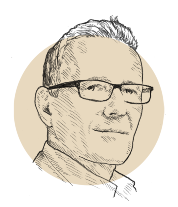Putin and the oligarchs! These two words are inextricably linked. Since the fall of the Soviet Union in December 1991, the terms “oligarchy” and “oligarchs” have replaced nomenklatura and apparatchiks. But this lexical shift goes beyond semantics. Within the Communist system, apparatchiks (the Russian name for the members of the state apparatus, a sort of class of senior civil servants and military officials) and the nomenklatura (“list of names” in Russian, referring to the general elite establishment), drew their wealth and power from their positions. In modern Russia, the word “oligarchy” is used to describe a minority of businessmen with ties to the government who have become immensely rich since 1991. One of the best known among them is Roman Abramovich, a London-based Russian billionaire and former owner of the Chelsea soccer club.
While it came back into fashion following this major chapter in Russian history, the term actually originates in Ancient Greece. Etymologically broken down into oligos, “few,” and arkho, “rule,” oligarchy refers to power held by a select few individuals. Over time, terms for different types of government have been devised using the suffix “-cracy,” from the Greek kratos, “power.”
These terms include “autocracy,” a system in which power is held by a single person; “aristocracy,” held by the finest in the country (aristos, “the best”), which usually means the high-born; and “plutocracy,” held by the wealthiest (ploutos, “wealth”). Meanwhile, the church commands the nation in a “theocracy” (from theos, “God”), much like in Ayatollah-led Iran. Following this same model, a whole host of other words are now used to describe categories of the population who wield a specific social might. Think “technocracy” (technicians and scientists), “gerontocracy” (the elderly), “kleptocracy” (profiteers and the corrupt), and “phallocracy” (men, in relation to women). And don’t forget “bureaucracy”!
When it comes to political power itself, we all know that a monarchy is government by a single individual, more often than not invested with a certain religious holiness – particularly among European kings and emperors, and Middle Eastern emirs. Once absolute, most monarchies – at least in Europe – are now constitutional, with the monarch playing a symbolic role. As a result, these monarchies now belong to the category of democracies (from the Greek demos, “the people”). In these systems, citizens hold power directly or elect representatives to form a governing body such as a parliament.
The problem is that, while democracy supposedly guarantees the equality of all citizens before the law, it fails to prevent the growth of often outrageous social inequalities. This explains the profusion of words used to lambast the powerful, the affluent, the hierarchs, the governing class, and the oligarchy. In France, this final term is used liberally, always in a pejorative tone (naturally), to condemn the small number of individuals who use their power exclusively for their own gain. Often coupled with modifiers such as “financial,” “corporate,” and énarque (graduates of ENA, the Ecole Nationale d’Administration), this so-called oligarchy is a prime target in anti-elitist stances. In the rhetoric of the French far right, it has even replaced “establishment,” which was a favorite of Jean-Marie Le Pen.
However, those who are quickest to champion anti-elitist positions are ironically themselves part of the elite. This is the case in the United States with billionaire Donald Trump, but also in France, where the leaders of the populist far-left and far-right parties are mostly professional politicians whose careers have been pursued in the bosom of – and paid for by – the very system that they vilify. As the old expression goes: “Do what I say, not what I do!”
Article published in the January 2023 issue of France-Amérique. Subscribe to the magazine.












